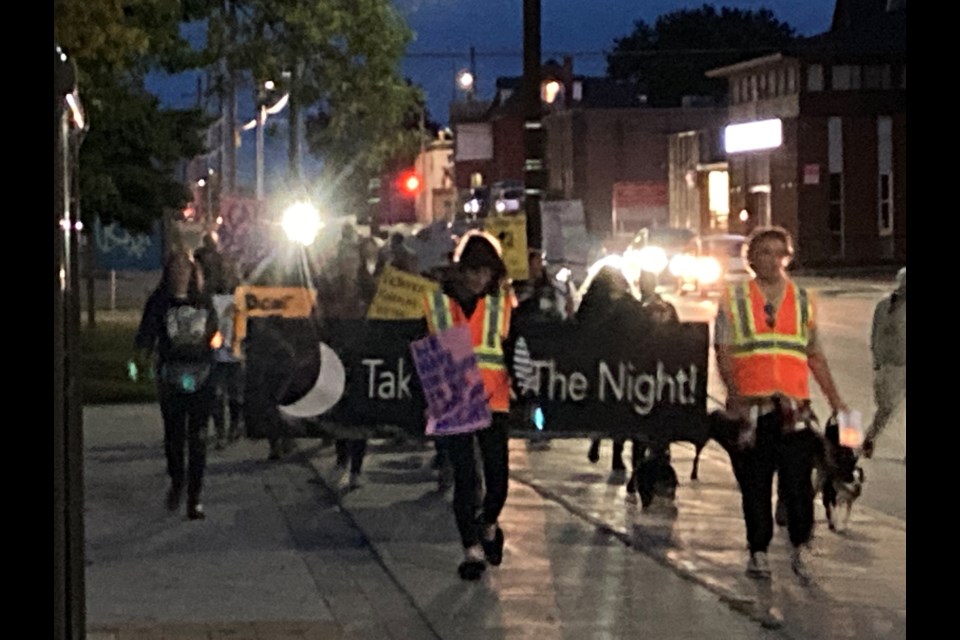Everyone should be able to walk down the street at night and feel safe, but the grim reality is, that this isn’t always the case.
People looking for a change, gathered at the Memorial Park at First Avenue and Ferguson Street Thursday night for North Bay’s family-friendly Take Back the Night march, which coincides with the global initiative to combat sexual violence and violence.
The large group of men, women, and children took to the streets of downtown North Bay carrying luminaries and handmade signs chanting “People Unite, Take Back The Night” and “What do we want? Safe streets! When do we want it? Now!”
It was the first in-person gathering for the annual march since the start of COVID.
“Take Back the Night has been around since the ’70s. It was originally a street rally and march to stand up against street harassment that women were experiencing in their communities. And it still is that today,” explained Natalie Austin, sexual violence prevention (SVP) coordinator at Amelia Rising Sexual Violence Support Centre.
“But it has expanded to be more about gender-based violence, sexual violence, partner violence, domestic violence, as well as being about street harassment.”
Statistics provided by Amelia Rising indicate that one in three women/girls, one in two trans-people and one in four men/boys have experienced sexual violence in their lifetime.
It goes on to state that the rate of sexual assault for Canadians aged 15 to 24 is 18 times higher than that of Canadians aged 55 and older.
The numbers for all instances of sexual and/or gender-based violence is actually said to be underreported due to barriers and stigma associated with stepping forward.
“During the pandemic, there was a definite increase in domestic violence and gender-based violence, but I think what people weren’t quite expecting was that there would be an increase in following situations where people would be followed while they walked down the street,” Austin added.
Last year’s theme “Lighting Up The Night and Shedding Light On Gender Based Violence Together” carried over to this year.
“These walks are very successful, they’re usually pretty well attended wherever they are held,” Austin said.
Prior to taking their message to the streets, the crowd heard from a number of guest speakers including Chelsea Leblanc.
”I went from a victim to a survivor, and I want people to be proud of the fact that they’ve been able to move ahead in their lives. Tonight is great because you meet people from all walks of life and we’re all standing together even though we come from all different places. You feel like you’re a part of a community,” said Leblanc who was attending her first Take Back The Night march.
“Having been a trauma survivor, when I was a victim I felt alone and you don’t want to feel alone. You want to feel like you’re a part of something, something more and this is definitely something more that is going to push us out of a bad hole.”
Regardless of age, sex, or background, people should feel safe in their surroundings.
“Walking on the streets downtown at night you just want to feel like you’re safe, not feel that you’re vulnerable,” said Leblanc.
“It is one of those things where I think when you are a woman you are kind of used to growing up hearing ‘you have to be careful, don’t go out at night, don’t wear this, don’t do that and it is hard because as an adult now, I think I should be okay and I should be able to be myself and go outside and not feel that I’m going to be victimized.”
Catcalling and verbal harassment are identified as forms of street harassment.
“We have even had reports from clients in recent weeks, telling us they have experienced street harassment,” shared Austin.
Harassment and gender-based violence also extend to the 2S-LGBTQ+ community.
“Originally this event was to bring attention to something that was happening to women and it still does disproportionately affect women, but now we know that it affects people of trans and non-binary genders as well,” Austin pointed out.
“Just this past July staff, members, and supporters of OUTLoud experienced having their property defaced for being involved with OUTLoud.”
Leblanc says while services available to help those affected, they are limited.
“We do need more services because I think a lot of the issues that we have in North Bay, especially where we feel threatened, I think what we’re lacking is proper mental health programming. It is there, it is very few and far between and there’s not enough funding for it. We definitely need more funding .”
The 45-minute march stopped at North Bay City Hall where Erika Lougheed addressed the crowd.
“I feel very passionate about this subject. We have a municipal election coming up and violence comes in many forms and I want to let you know that the root cause of a lot of the violence we see today stands in policies,” Lougheed stated.
“There is a direct link between people who area suffering and struggling and the policies that are made today around the table,” said Lougheed who challenged municipal candidates in the upcoming election to read up on social issues.
“I need you to understand that income and poverty are the biggest drivers of health inequity, of disease, of violence. And when we see people in poverty, in particular, Indigenous women and girls, and LGBTQ individuals these are all people who are impacted the most by these policies so hold them (policymakers) accountable, hold their feet to the fire. Ask them the tough questions.”
Lougheed encouraged voters to:
“Hold these people accountable for their actions, for their decisions. People are not vulnerable by design they are vulnerable by the policies made.”
Amelia Rising has been hosting Take Back the Night events and marches for roughly two decades.



